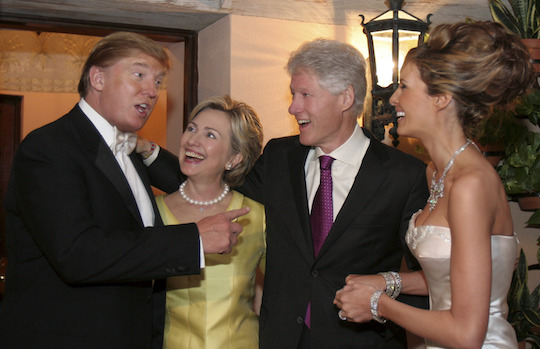On the morning of the first presidential debate between Donald Trump and Hillary Clinton, no less a soothsayer than Nate Silver believes this election is a dead heat. His FiveThirtyEight forecasting blog gives Clinton about a 52 percent chance to win the presidency, compared to Trump’s forty-eight. Let us pause here for a moment and consider how crazy that is. Trump has no experience in elected office, spent most of his time in the public eye as a punchline, and launched his campaign with a flurry of gaffes and lies that has become a blizzard since. A rational electorate should not like him. But he is running against a candidate who embodies the Democratic Party, and that brand is in danger of becoming toxic.
It’s weird, because for most of my life, the Democrats were anti-establishment. Of course, it is ridiculous to call one of the two major political parties in the United States “anti-establishment.” But Democrats felt that way. During the Reagan years, they were the party of minorities and the working poor—the party that resisted, vainly, the president’s plans to roll back the welfare state and make America a business again. They were similarly conscientious objectors to the agenda of George W. Bush, albeit similarly ineffective.
These are gross generalizations, of course. Shamefully, the Democratic Party went along with the invasion of Iraq, and they should probably be just as ashamed of their failure to stop Reaganomics not just under Reagan but for the last 35 years. At least they were the party of progressive social ideas, though—the party of hope, the party of change.
That last aspect of their brand identity does not apply anymore. As this insightful analysis by Adam Kotsko points out, this year Democrats are running on the status quo. Clinton, the wife of a former president whose name continues to usurp “Kennedy” as the byword for Democratic heredity, is essentially running on her promise to continue the Obama presidency. She might be more aggressive in the Middle East, and she might, maybe, get the federal government involved in paying for college. But as her historic outreach to centrist Republicans suggests, her campaign appeals most to moderates, appalling conservatives and leftists alike.
Trump, meanwhile, does not alienate anyone with his ideology, because he has none. He alienates people with his demeanor, his disregard for truth, his substitution of prejudices for politics. He is the candidate who will blow it all up. That pitch should repel thinking voters. But feeling voters, who do not closely follow politics but still blame it and have a vague sense of what the brands mean, are eating it up.
Again we return to the fundamental principle of marketing in America: the best way to sell something is to brand it as anti-establishment. For decades, Democrats enjoyed this advantage over the socially and fiscally conservative Republican Party. But the Republicans are so un-conservative that they have made “conservative” a byword for radicalism, even nihilism. The government is liberal. The media is liberal. Society is liberal, and it must all be destroyed and reforged again in the fires of conservatism.
It is strange enough that the GOP has embraced rabid and total negation, that the party of business and church has repositioned itself as rebellious. But Trump is outside even that—an upstart who seized his party’s nomination against its will, a bomb-thrower among bomb-throwers. If we proceed from the idea that you sell something by positioning it against an imagined mainstream, what better candidate than Trump could there be? Virtually anyone. But what worse opponent could you put up against him than Clinton?
Perhaps we will remember 2016 as the election where we all agreed that things were bad, and the candidate who would make them worse ran against the candidate who would keep them the same. The choice seems clear. But if you convince yourself that maybe worse would actually be better—that the jigsaw puzzle is not solved, now, so the only course of action is to shake the box—it becomes a closer race.
I don’t think Clinton is actually the candidate of petrification. I think she is the candidate of continuation, and that in her moderacy she has ignored real and pressing problems. Trump has ignored those problems, too, but he has substituted fake ones: immigrants, an imagined liberal conspiracy, the whole political class. Clinton represents that class through and through. In retrospect, she seems like a uniquely bad candidate to beat Trump. But she is the one we’ve got, and I hope she wins. I hope even as I despair.




